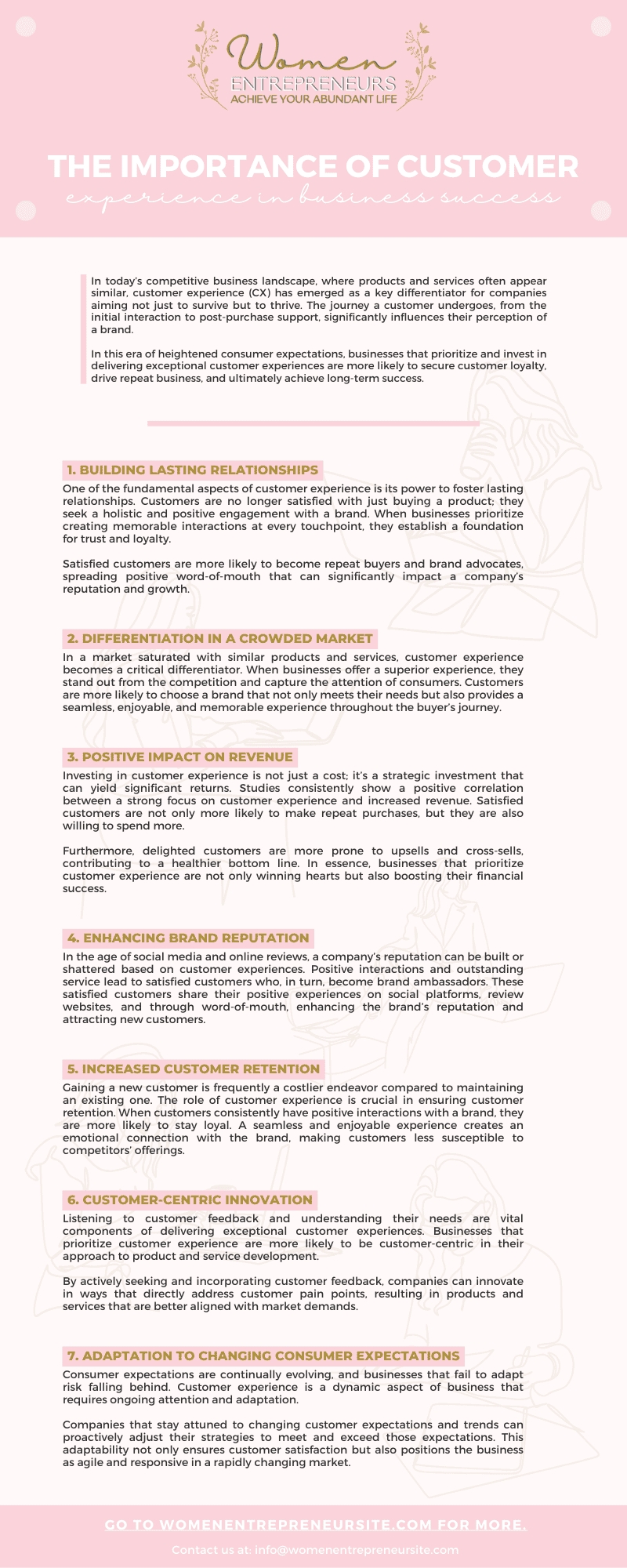In the realm of professional growth, there comes a pivotal moment for many individuals when the…
The Importance of Customer Experience in Business Success

In today’s competitive business landscape, where products and services often appear similar, customer experience (CX) has emerged as a key differentiator for companies aiming not just to survive but to thrive. The journey a customer undergoes, from the initial interaction to post-purchase support, significantly influences their perception of a brand.
In this era of heightened consumer expectations, businesses that prioritize and invest in delivering exceptional customer experiences are more likely to secure customer loyalty, drive repeat business, and ultimately achieve long-term success.
>> Buy your own Wifi now! Manage your Social Media anytime, anywhere:
1. Building Lasting Relationships
One of the fundamental aspects of customer experience is its power to foster lasting relationships. Customers are no longer satisfied with just buying a product; they seek a holistic and positive engagement with a brand. When businesses prioritize creating memorable interactions at every touchpoint, they establish a foundation for trust and loyalty.
Satisfied customers are more likely to become repeat buyers and brand advocates, spreading positive word-of-mouth that can significantly impact a company’s reputation and growth.
2. Differentiation in a Crowded Market
In a market saturated with similar products and services, customer experience becomes a critical differentiator. When businesses offer a superior experience, they stand out from the competition and capture the attention of consumers.
Customers are more likely to choose a brand that not only meets their needs but also provides a seamless, enjoyable, and memorable experience throughout the buyer’s journey. This differentiation can be a powerful tool for attracting new customers and retaining existing ones in a fiercely competitive environment.
3. Positive Impact on Revenue
Investing in customer experience is not just a cost; it’s a strategic investment that can yield significant returns. Studies consistently show a positive correlation between a strong focus on customer experience and increased revenue. Satisfied customers are not only more likely to make repeat purchases, but they are also willing to spend more.
Furthermore, delighted customers are more prone to upsells and cross-sells, contributing to a healthier bottom line. In essence, businesses that prioritize customer experience are not only winning hearts but also boosting their financial success.
4. Enhancing Brand Reputation
In the age of social media and online reviews, a company’s reputation can be built or shattered based on customer experiences. Positive interactions and outstanding service lead to satisfied customers who, in turn, become brand ambassadors.
These satisfied customers share their positive experiences on social platforms, review websites, and through word-of-mouth, enhancing the brand’s reputation and attracting new customers. Conversely, a negative customer experience can spread rapidly and tarnish a brand’s image, making it crucial for businesses to prioritize customer satisfaction and address issues promptly.
7 Steps to Becoming a Network Marketing Professional
More than two decades ago, Eric Worre experienced a transformative moment during a corporate event, which led him to commit to becoming an accomplished professional in network marketing. Since then, he has concentrated on acquiring the necessary skills to succeed, positively influencing numerous individuals worldwide.
Through his teachings, Worre imparts his knowledge and offers guidance on deciding whether to pursue network marketing professionally and achieve the life of your aspirations.
5. Increased Customer Retention
6. Customer-Centric Innovation
Listening to customer feedback and understanding their needs are vital components of delivering exceptional customer experiences. Businesses that prioritize customer experience are more likely to be customer-centric in their approach to product and service development.
By actively seeking and incorporating customer feedback, companies can innovate in ways that directly address customer pain points, resulting in products and services that are better aligned with market demands.
7. Adaptation to Changing Consumer Expectations
Consumer expectations are continually evolving, and businesses that fail to adapt risk falling behind. Customer experience is a dynamic aspect of business that requires ongoing attention and adaptation.
Companies that stay attuned to changing customer expectations and trends can proactively adjust their strategies to meet and exceed those expectations. This adaptability not only ensures customer satisfaction but also positions the business as agile and responsive in a rapidly changing market.
Tricks on How to Talk to Anyone
Throughout her professional journey, she has dedicated herself to educating people on the art of effective communication. In her book, “How to Talk to Anyone,” Lowndes presents 92 practical and efficient techniques for achieving success, starting from initial interaction strategies to advanced tactics used by accomplished individuals.
Final Thoughts
In the modern business landscape, where products and services can be easily replicated, customer experience emerges as a crucial factor that sets successful companies apart. Prioritizing customer experience isn’t just a trend; it’s a strategic imperative for businesses aiming to build lasting relationships, differentiate themselves in a crowded market, boost revenue, enhance brand reputation, increase customer retention, drive innovation, and adapt to changing consumer expectations.
Ultimately, businesses that recognize the importance of customer experience and commit to delivering exceptional interactions at every stage of the customer journey are better positioned not only to survive but to thrive in the competitive marketplace.









